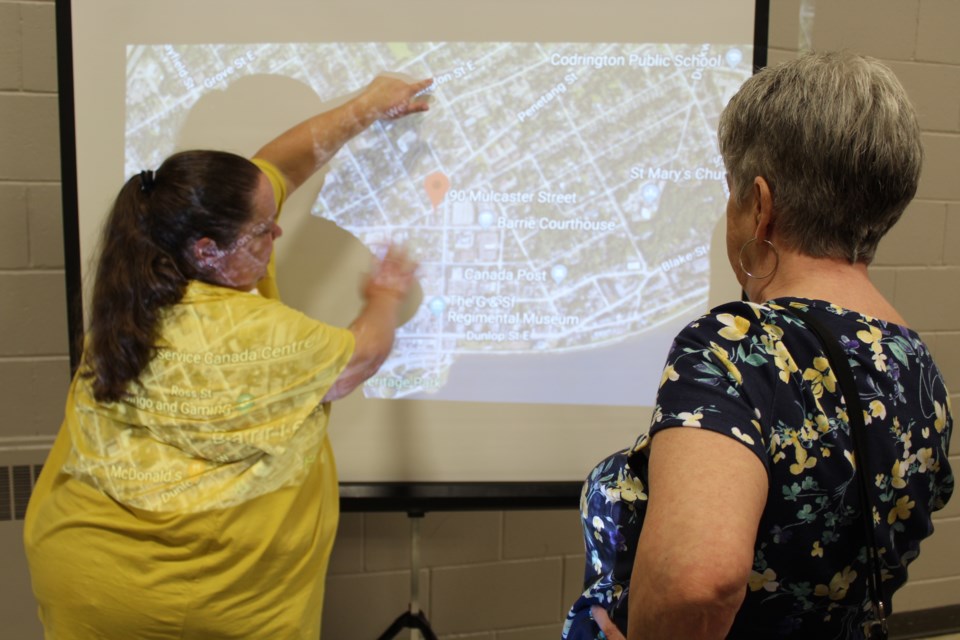There seemed to be very little middle ground during an open house Wednesday night to discuss a proposed supervised drug consumption site in downtown Barrie.
It was a mix of people who were either dead set against it, or those who resigned themselves to the fact that it's coming.
The building at 90 Mulcaster St., which is owned by the Canadian Mental Health Association (CMHA) and is located next door to the David Busby Centre, has been chosen as the preferred location for the provincially funded supervised consumption site (SCS).
The SCS is part of the harm-reduction push to battle the opioid crisis in Barrie, which has one of the worst drug problems in Ontario.
Residents in the Mulcaster Street neighbourhood had a chance to learn more about the proposed facility Wednesday night.
Wednesday's three-hour drop-in meeting, which was held in the fellowship hall at nearby Collier Street United Church, included information about location requirements, operations, site plan, access to care, policies and procedures, and neighbourhood safety.
Margie Mills, who has lived on Peel Street for 18 years, said she has a litany of issues and concerns with the chosen site, including its proximity to the David Busby Centre, halfway houses and subsidized housing.
"I'm totally against concentrating these things in one neighbourhood," Mills told BarrieToday. "If it has to happen, share the load across the city, because it's too much. It's just getting worse and worse and worse..."
Mills said she didn't learn anything new at the open house.
"It's exactly what I thought I was going to see," she said. "It'll never change my opinion."
On the other side of the fence was Dave Hendricks, who has lived at the Bay Club building on Collier Street for the last eight years. He said he supports the site and what it could do to help people.
"It's going to happen, I'm not concerned," Hendricks told BarrieToday. "It's proven itself in Vancouver. Read the reports and do your own research. It's just NIMBY, which is to be expected. I'm not surprised.
"It is a tough question, though," he added. "You could take the attitude that they should just take drugs until they die, but I'm not so sure that's the right attitude."
Hendricks also said he's not worried that the SCS would make the city's drug problem worse.
"They're here now, so you've got to do something," he said.
Supervised consumption sites provide a safe and clean space for people to use their own drugs under the care of nursing staff. They can also connect users to doctors, treatment and other health and social services.
A local group, including the CMHA, Gilbert Centre and the Simcoe Muskoka District Health Unit, has been working on an application for what the Ford government calls a Consumption and Treatment Services (CTS) facility.
The three organizations each had a table set up, with the CMHA discussing the chosen location and ways to access addiction treatment, the health unit talking about public consultation and mitigation measures to address concerns, and officials from the Gilbert Centre, which will take the lead on operations if approved, answering questions about hours, staffing and other policies.
A health unit official said just over 100 people attended the drop-in session.
Matt Turner, harm reduction co-ordinator at the Gilbert Centre, said many of the concerns he heard Wednesday night were to be expected.
"A lot of people feel it's going to upset the neighbourhood and make the problems worse," Turner told BarrieToday. "Those are valid concerns, but hopefully we'll be able to address some of their concerns."
Turner said opinions also seemed to be split from people he spoke to at the meeting. One of the common themes brought up was around a perceived increase in discarded needles in the area, but he said the data shows that's unlikely to happen.
Mitigation measures will be put in place to address any issues around the site, he added.
The group behind the CTS application is scheduled to make a presentation during general committee at Barrie City Hall on May 27. City council is expected to vote on the location, and whether they support it or not, on June 3. From there, the CTS application would be sent to the province.
For more information about the supervised consumption site, visit www.smdhu.org/scs.



